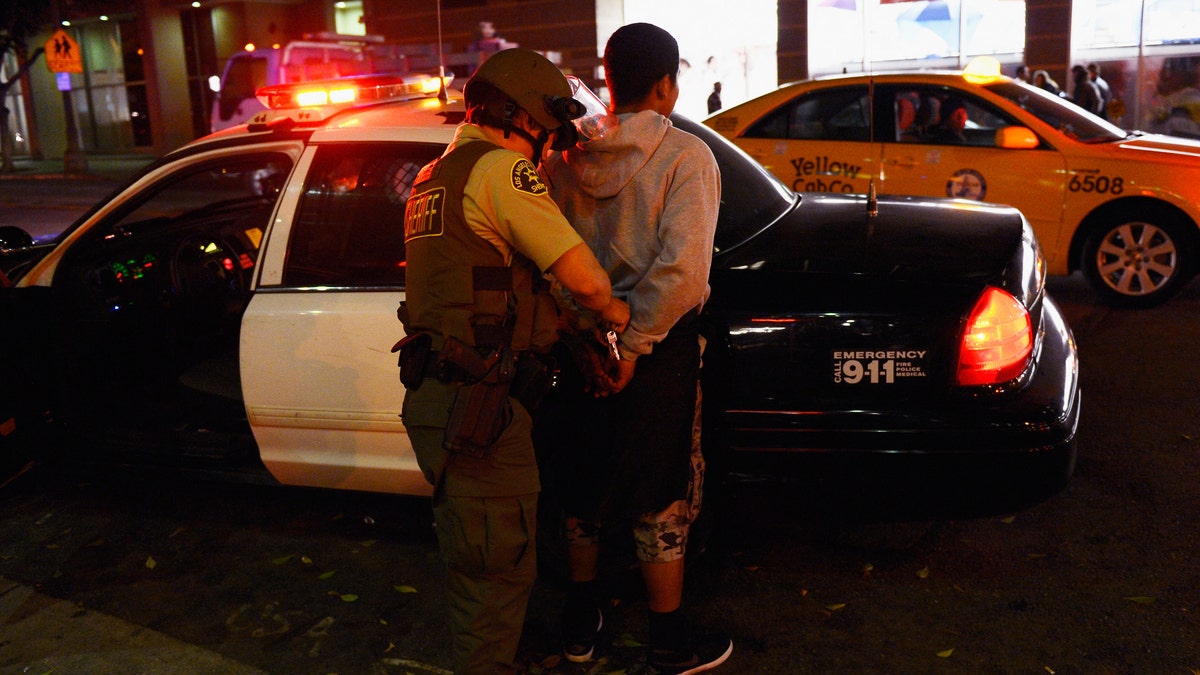
LOS ANGELES, CA - JUNE 11: A Los Angeles County Sheriff's Deputy releases a man after detaining him during disturbances after the Los Angeles Kings defeated the New Jersey Devils to win the 2012 Stanley Cup Final June 11, 2012 in Los Angeles, California. The win is the Kings first NHL championship in franchise history. (Photo by Kevork Djansezian/Getty Images) (2012 Getty Images)
LOS ANGELES (AP) – The nation's largest sheriff's department agreed to a sweeping settlement Tuesday with the U.S. Justice Department over long-standing civil rights abuses by deputies in the Mojave Desert.
The deal approved by the Los Angeles County Board of Supervisors comes less than two years after federal prosecutors identified a pattern of discrimination that included unconstitutional stops, searches, seizures and excessive force against blacks and Hispanics in Palmdale and Lancaster.
Deputies harassed and intimidated blacks and others in public housing, showing up for inspections with as many as nine officers, sometimes with guns drawn, the Justice Department said in its June 2013 report.
Under the agreement approved 4-1 by the board, the Sheriff's Department admitted no wrongdoing, but agreed to be monitored by three outside experts and must meet 150 requirements over the next four years.
It also agreed to pay $700,000 to residents who were harmed by alleged violations of the Fair Housing Act, much less than the $12 million the government once sought, and a $25,000 penalty.
- In Mexico, e-commerce has a long way to go to conquer street commerce
- Best pix of the week
- Ash from Chilean volcano covers fields, towns
- Bizarre ‘platypus’ dinosaur found in Chile
- Activist, labor leader … swabbie? Cesar Chavez honored for his U.S. Navy service
- Gisele Bündchen takes one last stroll down the runway
- First De la Renta’s bridal line without him retains much of its glamour
The agreement is the second major settlement in less than six months since Sheriff Jim McDonnell took office and promised to reform the scandal-plagued department. Former Sheriff Lee Baca abruptly stepped down last year after 18 subordinates were charged with federal crimes ranging from beating inmates and jail visitors to obstructing justice.
In December, supervisors approved a settlement requiring federal court oversight and a new use-of-force policy in a class-action lawsuit brought by jail inmates who claimed they were savagely beaten by guards.
McDonnell said the latest agreement allows the department "to look to the future, rather than the past," and build upon the third of the requirements it's already met under the agreement.
McDonnell said in a news release that the department had made strides toward training in constitutional law, racial profiling awareness, and policies regarding traffic stops and arrests.
The atmosphere in the Antelope Valley has changed noticeably since the Justice Department launched its investigation, according to a community member who was active in seeking reform.
"They're not harassing and stopping individuals for minimal offenses anymore," said Emmett Murrell. "They overused the authority inherent in the Sheriff's Department. ... It was just harassment."
The Justice Department found that violations of department protocol were tolerated because of accountability lapses at Antelope Valley sheriff's stations. Only one misconduct complaint was formally investigated out of 180 received from residents one year.
The misconduct fueled distrust and created a divide between law enforcement and the community.
Discrimination has festered in the Antelope Valley as demographics shifted from primarily white to black and Latino, who now make up more than two-thirds of the city of Palmdale's roughly 150,000 residents.
Overzealous enforcement of a rental-assistance voucher program, also known as Section 8, for participants in public housing was motivated in part by an uncorroborated perception in the community that blacks had brought gangs and crime to the area, the Justice Department said.
In at least one case, a deputy conducting a housing compliance check apparently helped fuel hatred by sending photographs of luxury vehicles in a home's garage to the person who set up an "I Hate Section 8" page on Facebook.
The family's home was vandalized with a racist message scrawled on the garage door and urine was thrown on their son by someone who called him a racial slur.
The family moved back to inner city Los Angeles to escape further harassment.
In addition to the two settlements, a civilian oversight commission is being created to keep watch of the sheriff. The makeup and authority of that group has yet to be determined and some organizations have suggested it won't have the power to hold the sheriff accountable.
"This tidal wave of problems that has engulfed the Sheriff's Department should be more than sufficient to demonstrate to the board of supervisors and to Sheriff Jim McDonnell that they must put in place a strong civilian oversight board to ensure that the abuse and violence of past decades is not repeated," said Peter Eliasberg, legal director of the American Civil Liberties Union, which filed suit in the inmate abuse case.







































